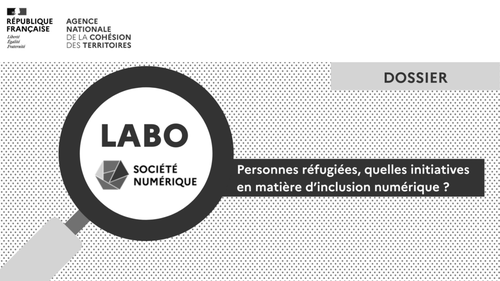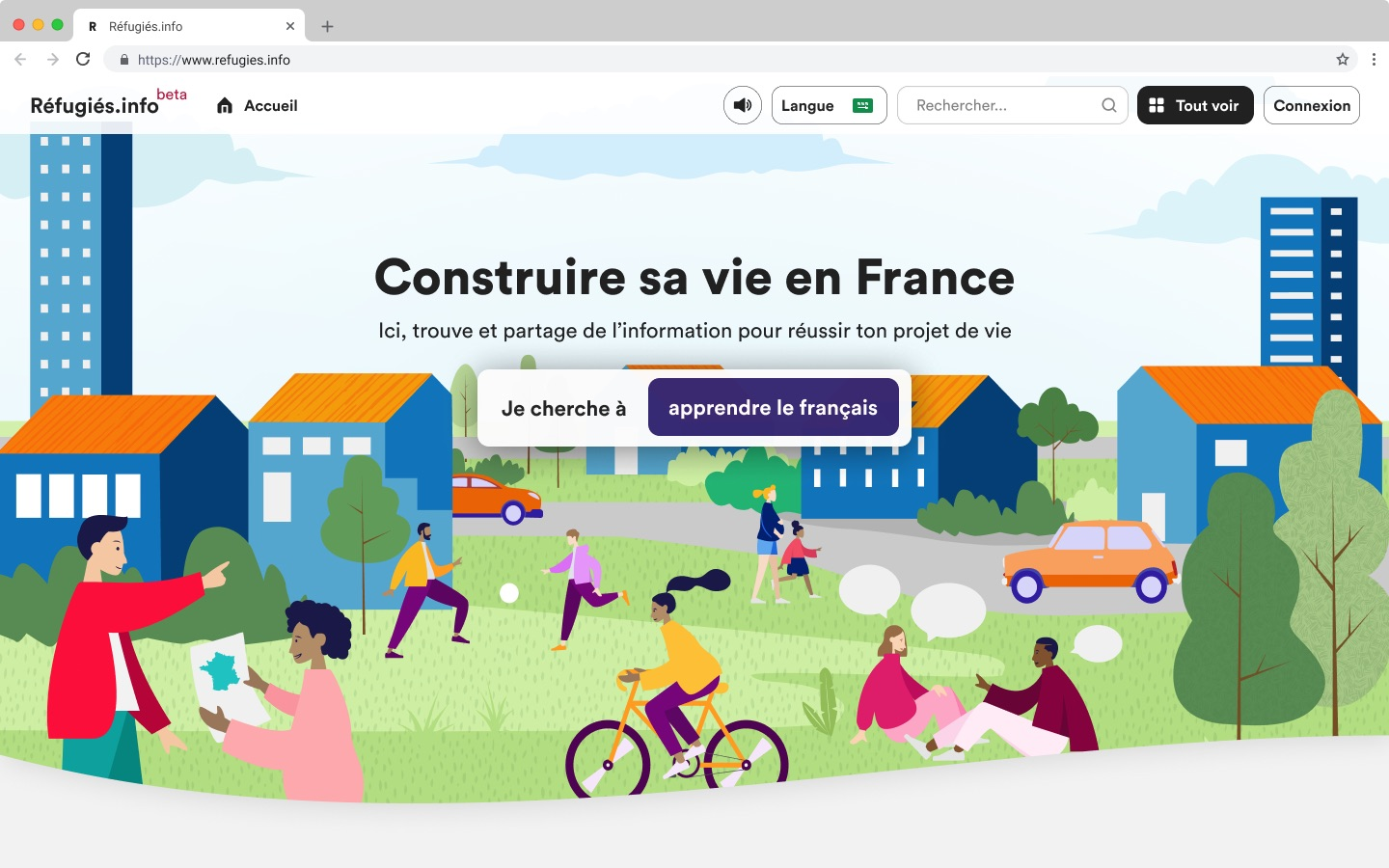
300,000 people had refugee status in France in 2020. For these people, knowing their rights, accessing housing, finding a job, training, practicing a sport, and accessing culture are all complex procedures that are often done via the Internet.
In September 2020, the Interministerial Delegation for the Reception and Integration of Refugees (Diair) published a strategy to combat the digital divide. strategy to fight against the digital divide. As part of this strategy, the Diair conducted a survey on the digital uses of refugees, opened the website refugies.infoand launched a call for projects to fight against the digital divide affecting refugees. It has also just published a guide of good practices for the digital inclusion of refugees. Details of these elements below.
A public digital inclusion strategy for refugees
The Diair has used its public innovation laboratory, the Lab'Rto develop a strategy to fight the digital divide in collaboration with its institutional and associative partners.This approach has resulted in a digital inclusion strategy for refugees, based on 4 axes:
- Studying usage to better understand the needs of refugees;
- Improve access to computer equipment;
- Improving Connectivity for Refugees;
- To train as many people as possible in digital technology.
The digital uses of refugees
At the end of 2020, Diair launched a survey of more than 450 refugees and 437 caregivers (social workers, digital mediators, civic service volunteers) on the digital uses of refugees.The aim of the survey was to provide actors in the field of refugee reception and integration with a knowledge base on the digital uses of refugees and their accompanying persons.
- 80% of refugees surveyed go online every day;
- 80% of refugees surveyed said they use the Internet every day;
- They go online mainly to contact their loved ones (80%), to have fun (64%) and to complete administrative procedures (42%).
20% feel a need for training in online procedures and 19% for social assistance. Finally, 40% want to be trained in the use of office software.
"The authors note that "what emerges very clearly from the survey is the challenge of increasing the digital skills of refugees. However, this is made particularly complex by the very low computer and French skills of a large proportion of people and the high stakes of opening up rights over a limited period of time.Next: The digital uses of refugees.
Réfugiés.info: a public digital platform to help welcome refugees
In March 2018, Diair designed and implemented a digital platform, Refugies.info to bring simple, translated information to refugees and their caregivers.The challenge was to offer an adapted user experience, multilingual content and services in connection with a network of actors (associations, administrations, communities) already involved in these subjects.
This platform has been designed to be as close as possible to the territories for both contributions and translations.
Refugies.info has three missions:- Identify support mechanisms throughout the country: " Many mechanisms are emerging in France to welcome and support refugees. These actions sometimes suffer from a lack of visibility and do not benefit the greatest number of people. Réfugiés.info's mission is to identify, make visible and make accessible these numerous initiatives.
- Simplifying and translating administrative procedures: " As soon as they are granted international protection, refugees are subject to ordinary law, which triggers numerous administrative procedures. Réfugiés.info publishes practical information sheets to explain these procedures and gathers volunteers to translate them into the main languages of integration.
- Creating personalized integration paths: " Obtaining asylum means above all rebuilding a home, a network, a vocation. Uprooting has often blurred one's bearings, ambitions and objectives. Réfugiés.info offers a tool that structures the action and allows refugees to reach their life objectives faster and more serenely.
Références :
was designed and developed by Diair's lab'R. The lab'R is among the 15 winners selected by the jury of Etalab's Entrepreneurs of General Interest (EIG) challenges in July 2019.Eleven projects to fight the digital divide affecting refugees selected in 2020
The Diair and the Directorate of Integration and Access to Nationality (DIAN) of the Ministry of the Interior had launched in 2020 a call for projects to fight the digital divide affecting refugees.Of the 37 applications received at the close of the call for projects, 11 were selected.
Emmaüs Connect: The project led by Emmaüs Connect, at the national level, will give 1,000 refugees access to the internet and will enable 250 of them to be equipped with digital equipment at a fair price thanks to the lacollecte.tech platform. To help them learn how to use the tool, social workers in the temporary accommodation centers (CPH) will be trained and a personalized program will be offered to refugees.Entraide Pierre Valdo: The NUM'R project offers laptops at a solidarity rate to 150 refugees in 3 regions. Young people in civic service will be mobilized to train them and lead digital mediation workshops.French Red Cross: The French Red Cross is carrying out an experimental project to offer training and define a process for equipping people with digital equipment with a view to spreading it nationwide. The test beneficiaries will have smartphones, an Internet connection and training that will allow them to identify good practices and improve educational content.Coallia: The "Pouvoir d'agir" project led by Coallia gives digital mediation its rightful place in the overall support of refugees. 233 people will benefit from the provision of equipment, access to a quality Internet connection and appropriate support. Co-constructed with beneficiary-witnesses, this project will produce a national spin-off plan.Unis-Cité: In connection with the national program Volont'R, Unis-Cité proposes to reinforce the digital autonomy of 600 refugees through mixed pairs of civic service volunteers (French and refugees). About a hundred group workshops on digital empowerment will be held in addition to individual meetings.France Terre D'Asile: The PAC project consists of equipping 45% of the structures managed by France Terre d'Asile with secure Internet access. This project helps prevent illiteracy and facilitates the immersion of refugees in the digital world through the global and personalized support offered in each establishment. GroupeSOS: The "Numerik'air 77" project developed by Groupe SOS will promote the autonomy of a hundred or so refugees in the digital world. To do this, it will build on the existing Air 77 access project on learning French and professional integration. In Seine-et-Marne, courses will be set up, combined with offers of reconditioned tablets at solidarity prices.Simplon: The "AlphaClic" project offers a short training course for newcomers to France, including beneficiaries of international protection, on basic digital skills that should lead to digital autonomy in the areas of access to rights, finding and exercising employment and maintaining links with family and friends. The technical training provided, built for an A1 level public, is coupled with a linguistic training with a specific objective.Union Régionale de Fédération des Oeuvres Laïques d'Auvergne-Rhône-Alpes: " Equipping and training to fight against the digital divide affecting refugees" is an experimental project with an interregional dimension (Auvergne Rhône-Alpes, Bourgogne Franche-Comté, Pays de la Loire). One axis will focus on the creation of digital mediation places (Hub), the other on online training for caregivers (social workers, mediators) in order to better accompany the target audience.Groupe de Recherche et de réalisations pour le Développement Rural: The project "Travail, Intégration, Connexion - TIC : lutte contre la fracture numérique pour l'accès aux droits et à l'emploi des réfugiés et des primo-arrivants" (Work, Integration, Connection - ICT: fighting against the digital divide for access to rights and employment for refugees and newcomers) consists, in the regions of Normandy, Ile-de-France and Hauts-de-France, of proposing activities for discovering the digital world and appropriating digital procedures for accessing rights (taxes, social security, employment center) for newcomer foreigners.SINGA:Référence :
The project "Facilitating the socio-professional inclusion of beneficiaries of international protection (and non-beneficiaries) through employment or entrepreneurship by empowering them through training in digital tools" proposes a digital training course that is common to the whole territory and, on the other hand, an operational implementation of support through modules led by the association in Paris, Lille, Lyon and Nantes for beneficiaries undergoing training in entrepreneurship or employment.A best practice guide for the digital inclusion of refugees
"Improving access to digital equipment and a good connection, as well as increasing computer skills, are therefore major challenges for improving the integration process of this audience, which also has specific characteristics that need to be understood for better mediation.The Diair has developed a guide of good practices, intended for all the actors of the digital mediation for the benefit of refugees.
For the attention of digital inclusion actors, the guide recalls what asylum is, the basis on which refugee status is granted, the specificities of the integration process of Beneficiaries of International Protection (BPI) and formulates a series of recommendations.
Based on the survey on the digital uses of refugees published by the DIAIR (April 2021), the guide formulates a series of recommendations.
Read more : A best practice guide for the digital inclusion of refugees.
Référence :





